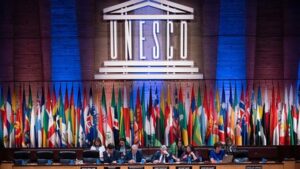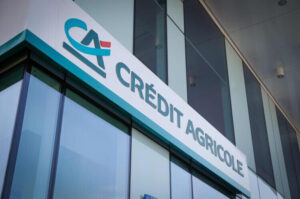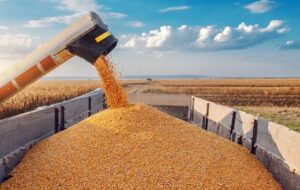
19 Ukrainian sites have been added to UNESCO’s International List of Cultural Property under Enhanced Protection, bringing the total number of Ukrainian sites on the list to 46, according to Deputy Prime Minister for Humanitarian Policy and Minister of Culture of Ukraine Tatyana Berezhnaya.
“The UNESCO Committee for the Protection of Cultural Property in the Event of Armed Conflict has just supported Ukraine’s initiative and adopted a corresponding decision. This is an important international victory and recognition of how responsibly Ukraine complies with international humanitarian law even during a full-scale war,” Berezhna wrote on Facebook on Thursday.
According to her, the total number of Ukrainian sites on the list has increased to 46. “This makes Ukraine one of the countries with the largest list of cultural heritage sites under the highest international legal protection in the field of humanitarian law,” the minister emphasized.
Berezhna noted that enhanced protection is the highest level of international legal protection provided for by the Second Protocol to the 1954 Hague Convention. Sites that receive this status must meet three key requirements: be of exceptional importance to humanity; be protected at the national level; and not be used for military purposes.
“In the context of full-scale Russian aggression, Ukraine has become the first country in the world to apply the mechanism of enhanced protection on a large scale during wartime, setting a new precedent in international practice,” the Minister of Culture emphasized.
According to her, it was also on Ukraine’s initiative that a discussion began last year on international legal responsibility for violating the immunity of objects under enhanced protection. The results of the study, conducted by a group of international experts, were presented during the 20th Session of the Second Protocol Committee.
The following sites were added to the Enhanced Protection List: Akkerman Fortress, Belgorod-Dnestrovsky, Odessa Region; Uspensky Cathedral, Kharkiv; Borisoglebsky Cathedral, Chernihiv; Kharkiv Academic Ukrainian Drama Theater named after Taras Shevchenko, Kharkiv; Church Building (St. Paul’s Church), Odessa; L.E. Kenig’s Estate: Palace (Main House), Trostyanets, Sumy Region; Molchansky Monastery, Putivl, Sumy Region; Pokrovskaya Church, Kharkiv; Primorsky Staircase, Odessa; Voskresenskaya Church, Sumy; Kirillovskaya Church, Kiev; Spaso-Preobrazhensky Cathedral, Sumy; Troitsky Cathedral, Sumy; The site of the chronicle city of Iskorosten, Korosten village, Zhytomyr region; The archaeological complex “Ostrov Baida,” Zaporizhia; Odessa Museum of Western and Eastern Art, Odessa; Odessa National Art Museum, Odessa; Odessa National Scientific Library, Odessa; Museum of Carpathian Art, Ivano-Frankivsk.
“Violating the ‘immunity’ of such sites is a serious international crime and entails double responsibility – both for the state and for individuals,” Berezhnaya noted.
Berezhna expressed her gratitude to UNESCO for its support of Ukraine, to Deputy Minister of Culture Anastasia Bondar, as well as to Lina Doroshenko and the entire team for their work. “I would also like to thank my colleagues from the Ministry of Foreign Affairs of Ukraine / MFA of Ukraine for their coordinated work,” she added.

Ukraine could attract up to €4 billion in private investment and create more than 17,000 jobs thanks to innovative construction, which includes the use of geopolymers, hempcrete, and 3D printing, according to a report by the International Finance Corporation (IFC) of the World Bank Group, “Rebuilding Ukraine: Opportunities for Investment in Innovative and Sustainable Construction.”
“As of the end of 2024, 13% of the total housing stock had already been damaged or destroyed, and a significant part of the country’s infrastructure had been affected in all major sectors (e.g., energy, transport, telecommunications, industry, social sector). The total investment needs for restoration and reconstruction were estimated at over $0.5 trillion over a decade, with housing accounting for the largest share,” the report says.
The IFC emphasizes that reconstruction creates an opportunity to build housing in a better and more efficient way, and the study identifies promising building materials and technologies that can help achieve this and build hundreds of millions of square meters of new, energy-efficient construction.
At the same time, the authors of the document note that private investment in innovative construction is hampered by a number of obstacles, including regulatory barriers, limited access to financing, low levels of education in the industry, and a shortage of skilled workers.
According to the study, Ukraine needs additional production capacity: 8 million tons of geopolymers, with an estimated investment of $1.36 billion, 6 million square meters of precast reinforced concrete – $1.5 billion, 0.7 million tons of basalt wool – $420 million, 0.1 million tons of basalt reinforcement – $420 million.
This list also includes the creation of capacity for the production of 0.5 million tons of hemp concrete, which requires $20 million in investment, 1 million cubic meters of autoclaved aerated concrete (AAC) – $100 million, 3D printing for construction – $50 million, and special glazing for 8 million square meters – $72 million.
3D PRINTING, geopolymer, innovative construction, INVESTMENT

The European Bank for Reconstruction and Development (EBRD) has provided Credit Agricole Bank (Kyiv) with a new guarantee that will enable the financial institution to issue loans to Ukrainian enterprises in the amount of EUR 150 million and cover up to 80% of the risk on them.
“We have a long-standing partnership with the EBRD and share a common vision of investing in resilience and sustainable development. Together, we are helping businesses recover, strengthen, and reduce their dependence on external risks, which is fully in line with our AIR strategy: Aim is to Invest in Recovery,” said Carlos de Cordoba, Chairman of the Board of Credit Agricole Bank, in a press release on Tuesday.
Under the terms of the program, Credit Agricole Bank will provide EUR 150 million to companies operating in critical sectors, as well as SMEs and mid-cap companies investing in energy production and storage, energy efficiency, and modernization.
As noted on the EBRD website, the project is divided into three components: the Resilience and Livelihoods Program, the Energy Security Support Facility, and the EU4Business–EBRD credit line with investment incentives.
The largest share of the portfolio coverage – up to EUR 80 million – is intended to finance working capital and private business investments in key sectors. EUR 40 million is earmarked for power generation, energy storage, and energy efficiency, and EUR 30 million for the modernization of MSMEs in line with EU standards, of which at least 70% must support green projects. This block provides for technical assistance and grant incentives after the completion of investments.
Eligible enterprises will also be able to receive technical assistance and investment incentives funded by the EU under the EU4Business initiative. Additional grants are provided for businesses and households that have suffered destruction, loss of assets, forced displacement, as well as for companies that promote the reintegration of veterans, persons with disabilities, and IDPs.
It is noted that this is already the third agreement on portfolio risk sharing between the EBRD and Credit Agricole Bank since the start of the full-scale invasion by the Russian Federation.
The EBRD has previously allocated EUR 75.4 million in EU grants to Ukrainian MSMEs under the EU4Business-EBRD line, of which EUR 2.25 million was allocated to projects involving Credit Agricole Bank.
According to the EBRD, since the start of the full-scale invasion, the bank has provided Ukrainian borrowers with approximately EUR 3.29 billion through 40 similar agreements with 12 partners. The loan programs are supported by partial coverage of first-loss risk, which is financed by France and the EU under the Investment Facility for Ukraine (UIF).
Credit Agricole Bank was founded in 1993, and its sole shareholder is Credit Agricole S.A. (France). According to the NBU, as of October 1, 2025, the bank ranked 11th (UAH 116.26 billion) among 60 banks in Ukraine in terms of assets.

The second-largest Ukrainian mobile operator, VF Ukraine (Vodafone Ukraine, VFU), which, in connection with the payment of dividends at the end of May, repurchased its own Eurobonds worth approximately $17.7 million based on several offers, has announced another similar tender at a price of 98% of the nominal value for a total amount of $1 million 164.7 thousand.
As noted in a statement on the Irish Stock Exchange on Thursday, prior to this, on December 2, the company made another monthly tranche of dividend payments in the amount of UAH 49.315 million, which is equivalent to the monthly ceiling for such payments set by the National Bank at EUR 1 million.
Applications for participation in the tender will be accepted until December 17 inclusive, and settlements are planned by the end of the year.
Bonds maturing in February 2027 with a nominal rate of 9.625% per annum were issued for $300 million. The redemption of Eurobonds is related to the fact that on April 24, 2025, VFU announced the payment of dividends to its shareholder in the amount of UAH 660.245 million ($15.9 million at the exchange rate specified in the announcement) for 2024. According to the restrictions of the National Bank, they will be paid in separate monthly dividend payments. Each such monthly dividend is expected to amount to UAH 1 million. The company emphasized that under the terms of the bond issue, in this case, it must offer all bondholders to submit an application for their sale for an amount equal to the amount of dividends paid outside Ukraine.
In the first two tenders, Vodafone Ukraine repurchased bonds for an amount equivalent to EUR 1 million. The debut repurchase was announced at a price of 99% of the nominal value, the second at 90% of the nominal value. The company did not announce the results of the second buyback on the stock exchange, while the scaling factor for the first buyback was 0.0040355668.
Following the results of the third tender, where the redemption price was reduced to 85% of the nominal value and the offer was limited to $4.67 million, Vodafone Ukraine received bids for $53.395 million and satisfied them in the amount of $5.208 million. The scaling factor was 0.1315451889487317.
The fourth tender was announced on August 13, but was then extended seven times. As a result, the redemption price was increased from 85% to 98%, and the redemption amount to $10.84 million. The company received bids for $127.14 million for this amount. Some of the bonds were returned to their owners due to the impossibility of reducing the nominal value, and the rest were accepted with a scaling factor of 0.1150681.
As a result, on the settlement date of November 20, bonds with a total nominal value of $10 million 773.23 thousand were purchased under the tender offer. All of them were canceled, and after such cancellation, the total nominal value of bonds remaining in circulation is $281 million 759.03 thousand.
As reported, VFU increased its net profit by 10.7% to UAH 3 billion 446.80 million and its revenue by 13.3% to UAH 19.03 billion in the first nine months of this year.
The report noted that the company will receive loans from related parties this year to service and redeem Eurobonds. In February, the parent company Telco Investments B.V. provided $49.59 million for partial repayment of the Eurobond debt. In June, an agreement was signed with Telco Investments for a dollar credit line in the amount equivalent to UAH 660 million, at 10% per annum, maturing in 2028.
Finally, in July 2025, a loan agreement was signed with the Dutch company Cemin B.V. for $10 million at 10% per annum, with a repayment date no later than the end of 2027, but not earlier than the maturity of the Eurobonds. The funds are credited in tranches to the company’s bank account in a foreign bank and are to be used to redeem bonds, which Vodafone Ukraine is doing in connection with the resumption of dividend payments this year.

The Ukrainian Grain Association (UGA) forecasts that the harvest of grain and oilseeds in 2025 will reach 81.4 million tons, compared to 79 million tons (+3%) a year earlier, the association’s press service reported.
“With such a harvest, exports in the current 2025/26 season could potentially reach 49 million tons (last season – 46.7 million tons). However, this is an optimistic scenario, the implementation of which depends on the resolution of serious logistical problems,” the UGA noted.
The association recalled that Ukraine is currently experiencing significant problems in grain export logistics due to constant Russian terrorist attacks on critical infrastructure: energy, railways, and seaports of Ukraine. As a result of Russian shelling of civilian infrastructure, railways and ports cannot operate at full capacity due to damage to their infrastructure, power shortages, and constant power outages.
“It is obvious that the inability to export significant volumes of the harvested crop due to logistical problems will not only have an extremely negative impact on Ukrainian agricultural producers and the price situation on the domestic market, but may also deal a severe blow to Ukraine’s economy and its balance of payments,” the UGA noted.
The UGA estimated the wheat harvest in 2025 at 22.5 million tons, compared to 22.4 million tons (+0.45%) a year ago. With this in mind, potential wheat exports in 2025/26 MY could reach 16.5 million tons, the UGA suggested.
The barley harvest in 2025, according to the association’s estimates, is 4.9 million tons, compared to 5.6 million tons (-2.5%) a year ago, and the likely export in 2025/2026 MY is forecast at around 2.3 million tons.
The UGA expects the corn harvest to reach 32 million tons, compared to 25.9 million tons (+23.6%), and experts believe that potential exports in the current season could reach 25 million tons, provided that logistics are unhindered.
The UGA forecasts the sunflower harvest in 2025 at 11.5 million tons, compared to 12.8 million tons (-10.2%) a year ago. Traditionally, almost all sunflowers will be processed in Ukraine – 11.4 million tons, while exports will reach no more than 50 thousand tons.
The rapeseed harvest in 2025 will be 3.2 million tons, compared to 3.8 million tons (-15.8%) a year ago, while exports in 2025/26 MY may reach only 2.1 million tons, with the rest being processed in Ukraine.
According to the UGA, the soybean harvest in 2025 will be about 5 million tons, compared to 6.8 million tons (-26.5%) in 2024, which is explained by a significant reduction in the area sown with this crop and poorer yields. Nevertheless, potential exports could reach 2.5 million tons in 2025/26 MY, with the rest being processed in Ukraine, as legislative restrictions make its export difficult, as is the case with rapeseed.
“As for next year’s harvest, since the acreage under winter crops is already known and taking into account the forecast for spring crops, next year’s potential harvest could amount to 84.5 million tons of grains and oilseeds, of which Ukraine could potentially export about 50 million tons of grains and oilseeds,” the UGA predicts.
The Ukrainian Grain Association (UGA) is an association of producers, processors, and major grain exporters, which annually export about 90% of Ukrainian grain products.